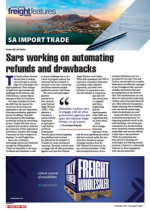The South African Revenue Service (Sars) is making waves through its cutting-edge new technologies and digital platforms. These changes brought both opportunities and challenges for the industry, said Clifford Evans, customs liaison manager at Berry & Donaldson.One major transition has been the shift from the manual DA 185 process for licensing and registration to the new registration licensing accreditation application process via eFiling. “This shift has presented several challenges, particularly during the onboarding process. Traders who have not yet completed this transition could face the suspension of their registrations and licences. However, this change is necessary for Sars to improve its database,” he told Freight News.Sars is also working on automating refunds and drawbacks through the eFiling platform. “There are limitations to the types of refunds and drawbacks as well as system challenges but, as it is a work in progress, industry has welcomed the Sars initiative to automate a very time-consuming and labour-intensive manual application process,” said Evans.The most noteworthy digital platform introduced by Sars, however, is the National Single Window (NSW). “This platform is currently in testing with the Department of Agriculture, Land Reform, and Rural Development. The next phase involves digitising the prohibited and restricted list, followed by the inclusion of Transnet for cargo tracking and reporting. Ultimately, customs aims to engage with all other government agencies and open the National Single Window to all traders. When fully operational, the NSW is expected to streamline declaration processing, reduce duplicate inspections, and lower costs. However, it's important to note that this initiative is a long-term plan that will take several years to complete,” said Evans, emphasising that the implementation of the NSW was a significant step for South Africa.Asked about changes impacting importers, Evans said the most significant procedural shift had occurred earlier this year when Sars introduced a game-changing transition from the EDI National Pool system to air, sea, and land modalities. “Under this revamped structure, all sea modality declarations are now processed by the Cape Town and Durban customs hubs, air modality declarations are efficiently managed by the Doringkloof Hub, and land modality declarations find their processing home in the Alberton Hub. This transformation not only allows for more precise monitoring of delays and turnaround times but also offers enhanced transparency, clearly indicating who is handling each case and the precise stage within the declaration process.”Evans said while the customs modernisation programme was impacting positively overall on the trade landscape, one unfortunate consequence was the diminishing direct interaction between industry stakeholders and customs officials in their day-to-day operations. “While the programme has been pivotal in adopting new technologies and reducing manual processes, it has led to a substantial reduction in direct engagement with customs authorities.”

